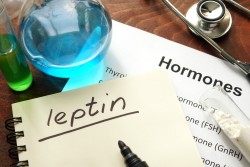Leptin: a better alternative to insulin therapy?
Type 1 diabetes mellitus (T1DM) constitutes the insulin-deficient form of diabetes caused by pancreatic β-cell loss. Emerging evidence challenges the dogma that insulin is a pre-requisite for survival as it does not restore normal metabolic homeostasis. Instead, it causes ectopic lipid deposition increasing the risk for heart disease. Furthermore, its capacity to rapidly clear glucose from the bloodstream often leads to hypoglycaemia. As early as 1995, another hormone, leptin – known for its role in body weight and food intake control – proved to have anti-diabetic properties at least in rodents. In these experiments, systemic leptin administration at low doses ameliorated hyperglycaemia and demonstrated that insulin was dispensable for normal glucose and lipid metabolism. Additional studies indicated that leptin reverses the consequences of insulin deficiency and ‘because it doesn’t cause hypoglycaemia and lowers circulating lipid levels, it represents an attractive adjuvant therapy for T1DM’, explains project coordinator Dr Coppari. The precise mechanism of action of leptin remains unknown. Scientists on the EU-funded LEPTINT1DM (Unravelling the mechanism underlying the anti-diabetic action of leptin) project investigated the hypothesis that the anti-diabetic function of leptin was mediated by the hypothalamus. Previous work by the consortium had shown the involvement of the central nervous system in regulating glucose homeostasis in response to leptin. ‘In the present study, we wished to further delineate the mechanism and examine if hypothalamic neurons mediated leptin’s anti-T1DM action’, states Dr Coppari. Leptin administration in preclinical models of T1DM To examine the efficacy of leptin therapy in T1DM, researchers generated mice lacking or expressing leptin receptor only in specific hypothalamic neurons. These hypothalamic proopiomelanocortin (POMC) neurons belong to the central melanocortin system, known for its role in body weight control through regulation of appetite and energy expenditure. POMC neurons have been shown to control glucose metabolism in insulin-normal animals. Subsequent destruction of the pancreatic insulin-producing beta-cells rendered these mutant mice diabetic. Following intracranial administration of leptin, scientists monitored the clinical symptoms of T1DM over time. They observed that in mice lacking leptin receptors only in POMC neurons, administration of leptin did not lower hyperglycaemia. The same effect was seen in diabetic mice expressing leptin receptors only in POMC neurons after leptin administration. Collectively, the findings of the LEPTINT1DM study demonstrated that leptin receptors on POMC neurons were required for mediating only a marginal component of the hyperglycaemia-lowering effect of leptin. POMC neurons played a minor role in leptin’s anti-diabetic action suggesting that other neurons are involved. In subsequent experiments, when scientists expressed leptin receptors on both GABAergic and POMC neurons they observed that leptin engagement with these receptors mediated its life-saving and antidiabetic effects in the context of insulin deficiency. Clinical translation of leptin monotherapy Insulin therapy bears several limitations and underlies a number of morbidities that threaten the lives of insulin-deficient patients. Although preclinical results of leptin administration seem hopeful, clinical trials have failed to show effectiveness of leptin administration in patients who do not lack leptin. Comprehensively understanding the neuronal and molecular mechanisms of leptin function in diabetes should aid in identifying new targets to counteract the metabolic dysfunctions caused by insulin deficiency. These targets will serve as the basis for the development of improved anti-T1DM strategies without the risks of hypoglycaemia and cardiovascular disease. In fact, harnessing the hypothalamic neural circuits and their downstream effector components may improve hyperglycaemia in cases of insulin deficiency.
Keywords
Leptin, insulin, type 1 diabetes mellitus, hypoglycaemia, LEPTINT1DM, hypothalamus, proopiomelanocortin neurons







